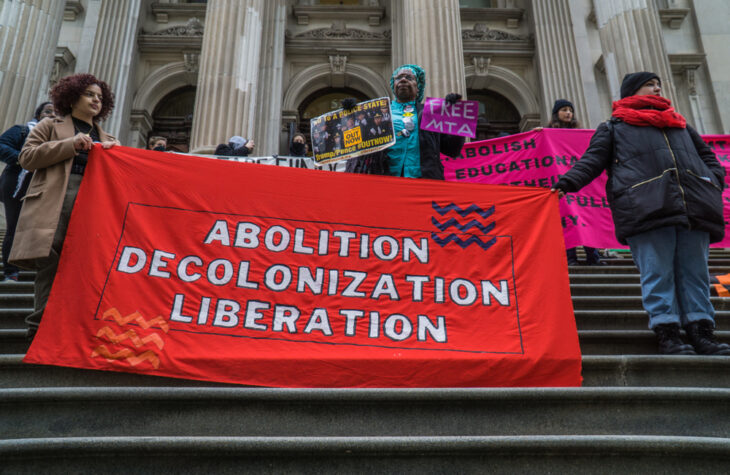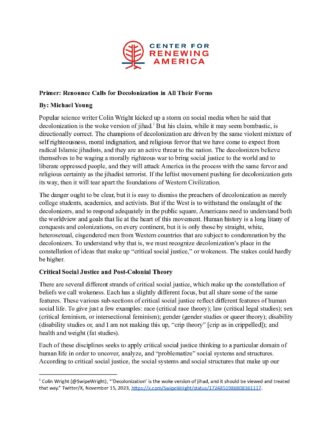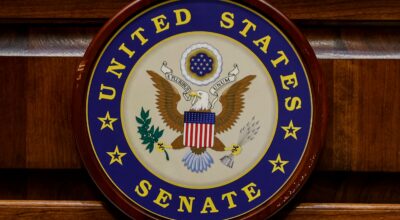
Primer: Renounce Calls for Decolonization in All Their Forms
Popular science writer Colin Wright kicked up a storm on social media when he said that decolonization is the woke version of jihad.1 But his claim, while it may seem bombastic, is directionally correct. The champions of decolonization are driven by the same violent mixture of self righteousness, moral indignation, and religious fervor that we have come to expect from radical Islamic jihadists, and they are an active threat to the nation. The decolonizers believe themselves to be waging a morally righteous war to bring social justice to the world and to liberate oppressed people, and they will attack America in the process with the same fervor and religious certainty as the jihadist terrorist. If the leftist movement pushing for decolonization gets its way, then it will tear apart the foundations of Western Civilization.
The danger ought to be clear, but it is easy to dismiss the preachers of decolonization as merely college students, academics, and activists. But if the West is to withstand the onslaught of the decolonizers, and to respond adequately in the public square, Americans need to understand both the worldview and goals that lie at the heart of this movement. Human history is a long litany of conquests and colonizations, on every continent, but it is only those by straight, white, heterosexual, cisgendered men from Western countries that are subject to condemnation by the decolonizers. To understand why that is, we must recognize decolonization’s place in the constellation of ideas that make up “critical social justice,” or wokeness. The stakes could hardly be higher.
Critical Social Justice and Post-Colonial Theory
There are several different strands of critical social justice, which make up the constellation of beliefs we call wokeness. Each has a slightly different focus, but all share some of the same features. These various sub-sections of critical social justice reflect different features of human social life. To give just a few examples: race (critical race theory); law (critical legal studies); sex (critical feminism, or intersectional feminism); gender (gender studies or queer theory); disability (disability studies or, and I am not making this up, “crip theory” [crip as in crippelled]); and health and weight (fat studies).
Each of these disciplines seeks to apply critical social justice thinking to a particular domain of human life in order to uncover, analyze, and “problematize” social systems and structures. According to critical social justice, the social systems and social structures that make up our society are built in such a way that certain groups are given advantage and certain groups are discriminated against. Society, wokeness concludes, needs to be radically reconfigured in order to put a stop to all of this unfairness.
Post-colonial theory is the subfield that focuses on the effects of western colonialism. Practically speaking, this means that post-colonial theory is the geopolitical branch of wokeness. Post-colonial theory is focused primarily on nations, land, ethnicity, power, resources, indigeneity, governmentality, and so forth. Its questions tend to be: “Who owns the land?”; “Who gets to decide what gets built where, who lives where, and how people live?”; “Who gets to be in charge of the government?”; “Which race and ethnicity gets to have the power?”; “Which groups get to have control over historical narrative?”
Post-colonial theory sees the mandate of critical social justice as quite literally a liberatory struggle for land and resources no different than the struggle between Germany and Britain during WWII. Because of this, it sees violent attacks against the social order as either justified or understandable acts of resistance. Post-colonial theorists often explicitly or implicitly defend violence as being a necessary part of decolonization.
Two Types of Post-Colonial Thought: Postmodern and Materialist
The literature of post-colonial thought probably begins with Frantz Fanon’s The Wretched of the Earth. There are two things about this book worth noting. The first is that Fanon was a psychologist and much of the work is concerned with the psychological effects of colonization on colonized people. The second is that Fanon states very clearly that decolonization is a violent process: “decolonization is quite simply the replacing of a certain ‘species’ of men by another ‘species’ of men. Without any period of transition, there is a total, complete, and absolute substitution.”2
These two points have embedded two principles in post-colonial theory. The first is a focus on culture and psychology. This includes a focus on beliefs, attitudes, self-esteem, communication, ideas, socialization, language, social cohesion, and mental health. A large section of Fanon’s book deals with various psychological ailments alleged to relate to colonialism, and Fanon was insistent that colonialism had psychological effects on both the colonized people and the people doing the colonizing. Coupled with his focus on culture, this has meant that from the get go, post-colonial theory was not only concerned with land, wealth, resources, and money, but also intensely concerned with ideas, beliefs, attitudes, ideologies, and language.
The second principle of post-colonial theory, derived from Fanon’s conclusion about the replacement of one species of man with another species of man, is the idea that violence is justified in decolonization. While it is no longer taken for granted that violence is necessary for all decolonization, it is still taken to be the case that decolonization is not something to be negotiated, or even asked for. Rather, decolonization is something that colonized people must take. This can be done peacefully, through voting, or it can be done violently. The basic point here is that when peaceful means of achieving “decolonization” fail, violence is more than an option. In fact, what Fanon says is (italics mine) “National liberation, national renaissance, the restoration of nationhood to the people, commonwealth: whatever may be the headings used or the new formulas introduced, decolonization is always a violent phenomenon.”3
These two points and their consequent principles create what are essentially two wings of post-colonial theory and how it is discussed in public. One wing is postmodern and focused on social elements (ideas, language, culture, psychology) while the other is materialist, focused on the material facts on the ground about who has control over land, money, institutions, resources, etc. These two wings play off of each other in a sort of chaotic dialectic: The postmodern wing deconstructs, dismantles, subverts, and otherwise undermines the bases of Western culture, and the materialist wing then takes advantage of the loss of faith to advance the decolonization project “on the ground.”
Where the postmodern wing is focused on ideas, beliefs, attitudes, concepts, art, discourse, and language, the materialist wing is focused on money, resources, wealth, land, and hard power. The materialist wing cares about who controls the institutions, who makes the decisions, who owns the land, who owns the resources, who has leadership in government, who decides what gets taught in schools, and so forth. This is not to claim that there is a completely decisive break between a postmodern wing and the materialist wing of post-colonial theory—theorists, radical organizations, and activists pull from both sides—but by and large, they can be identified as different strains that work together even as they often disagree and sit in tension with each other.
The way these two sides of post-colonial theory cooperate can be illustrated with an analogy. Think of what it might be like to remove a flag pole embedded in the ground. You can’t pull the pole straight up, as it won’t budge if a large portion of it is buried deep in the earth. What you have to do is wiggle the exposed pole back and forth, until it begins to come loose. If you continue to push back and forth, soon enough it becomes loose enough to pull out of the ground. This is how the two wings of postcolonial theory function as they attempt to uproot and dislodge the pillars of Western Civilization. The postmodern wing pushes in the cultural, psychological, and discursive direction, the radical materialists then push back in the direction of wealth, resources, ownership of land, and power. As they begin to make headway soon each pillar will be loose enough to be taken out of the ground and discarded.
Turning Post-Colonial Theory into Decolonization Practice
Now a little bit familiar with how these two strands of post-colonial theory function, let us turn to recognizing them in the world. As we have seen, the postmodern tradition focuses on beliefs, attitudes, language, concepts, ideas, and culture. This focus with post-colonial thought really began to develop in the late ’70s with two theorists: Edward Said and Gayatari Spivak, both of whom were drawing on the work of Michal Foucault and Jaques Derrida.
The postmodern view of the world suggests there are an infinite number of ways to interpret reality. Since all human beings are limited, and have only our own perspectives—and we are all shot through with self-interests, biases, agenda’s and the like—we simply are not able to get anything like an objective view of the world. Instead, what each person has is merely their own subjective, limited, skewed, biased, view of the world, and there is no objective way to adjudicate who is correct.
The postmodern thinker does not think of truth as a description of the world that corresponds to reality. Postmodern thinkers believe that what is held to be true says more about who gets to decide what is true, and how they get to decide what is true. In the postmodern view, a statement becomes “true” because the people in society with the power to decide what is true have said so. Whether a claim actually matches the world is not what matters. The only way claim X gets to have the status of “true” is when the people in society who have the power to decide what is true have chosen to say that claim X is “true.”
To oversimplify the matter for the sake of brevity, the postmodern thinker believes that knowledge and power are two features of the same object, and these two features mutually reinforce each other. The people who have power get to decide what counts as knowledge and truth, and the people seen as having knowledge and truth have power. These people who have power to decide what is true use that position to benefit themselves, to serve their own interests, to maintain their social position, and to increase their social status, social prestige, and clout.
As such, the postmodernist sees all knowledge as being socially constructed. That is, all the truth claims, beliefs, ideas, concepts, and justifications that people use were invented by humans on the basis of their interests. In other words, concept, idea, truth claim, fact, and so on are all things that are socially constructed (you might say “made up”) by people according to their interests. To the postmodernists, this means that every aspect of our culture has been shaped, molded, and structured according to the ideas, beliefs, agendas, bigotries, and most importantly the interests of the people who created it.
Thus the claim that the bigotry, agendas, and self-interest of dead white males has been baked into the fabric of society in the form of racism, sexism, homophobia, white privilege, and other sorts of injustice. Thus the claim that “systems of power” benefit people who are white, straight, and male, at the expense of everyone else. Wokeness claims these systems of power warp every element of Western culture in a way that harms people, and for that reason all of society must be radically restructured. Everything, including science, knowledge, truth, beauty, economics, education, sports, music, film, agriculture, and justice, is full of bigotries, biases, and self-interest and is the product of systems of power created by and for straight white males.
This is the postmodern wing of decolonization. Like all critical social justice theories, this wing divides up the world into oppressors and oppressed, but oppressors include the academics, intellectuals, artists, and others who get to decide what is good, beautiful, right, true, correct, valuable, praiseworthy, and so forth. This side of decolonization theory thinks people have been socialized, or brainwashed, by society into accepting cultural ideas that appear to be neutral but were in fact created to allow straight white males to exploit anyone who is not straight, white, or male.
Accordingly, this wing of decolonization believes that the task at hand is to disrupt, dismantle, and deconstruct the ideas, concepts, art, texts, institutions, philosophies, language, and anything else that upholds Western Civilization. The praxis of this wing of postcolonial theory tends to operate at the level of discourse, media, communication, ideas, art, entertainment, law, and in what we might otherwise call the realm of ideas.
The materialist militant wing of post-colonial theory takes its different but complementary approach. Rather than thinking of oppression as being about who gets a seat at the table in socially constructing the concepts and ideas that decide what is true, or what is good, or who is right, it sees power as exercised by the people who make decisions about land, resources, money, law, education, and so on. The real power, in this view, goes to the people who get to make the decisions that directly affect day-to-day lives.
For this reason, the materialist wing of decolonization sees the task of fighting oppression as doing what is necessary to take political power in the here and now. You will often see materialist activists holding up signs during their protests that read “decolonization is not a metaphor,” or “decolonization is not a tea party.” The point of these signs is that decolonization is not something that happens in the hearts and minds, rather, decolonization is a real tangible phenomenon in which, to again quote Fanon, “a certain ‘species’ of men” is replaced “by another ‘species’ of men.”
The post-colonial materialists are quite clear that they do not care about any damage that occurs to so-called “settlers.” As far as they are concerned, all the wealth created in places such as America and Canada where Europeans settled on native land ought to be given to the native tribes, and all the governing power ought to be given to “indigenous” people. They would argue that the entire nation of the United States is illegitimate—that none of the people who are not indigenous to the continent have any business having any kind of power over what happens on that land, or how the affairs of the people on that land are administered.
So, for example, Eve Tuck and K. Wayne Yang write in the first issue of the peer-reviewed Decolonization journal, “For social justice movements, like Occupy, to truly aspire to decolonization non-metaphorically, they would impoverish, not enrich, the 99%+ settler population of United States. Decolonization eliminates settler property rights and settler sovereignty. It requires the abolition of land as property and upholds the sovereignty of Native land and people.”4 Here we see that the materialist view of post-colonial theory has a very strong blood-and-soil, nationalist streak to it. Thus it is often considered to be more extreme than the postmodern wing. And, further—because the materialist wing demands real, tangible, material changes to society—it tends to lose patience with the postmodern wing and its obsession with culture, discourse, attitudes, and the like. These post-colonial theorists want to take power, and they want to do it now, and they are willing to use violence to do it.
Looking For Oppressors: Wokeness and Decolonization
We should step back for a moment to discuss the way that the term “decolonization” is used in popular critical social justice, or woke, discourse writ large. Wokeness sees all of Western society as being constituted by a matrix of interlocking systems of power, which oppress certain groups in order to advance the interests of other groups. Further, most strains of critical social justice, and thus wokeness generally, are heavily influenced by the same postmodern view of the world held by the non-materialist post-colonial theorists. This means that critical social justice in general tends to accept the argument that truth claims and knowledge are in fact subjective expressions of the views of the dominant group in society.
Critical social justice thus tends to accept the argument from figures like Spivak, Foucault, and Said which says that truth claims and knowledge are in fact subjective expressions of the views of the dominant group in society. As such, critical social justice does not view truth claims and knowledge claims as propositions to be analyzed on the basis of whether or not they accurately describe the world, but rather as an expression of the power of the dominant group in society to decide which views will be labelled “true” and which views will be labelled “false.” And, according to critical social justice, the dominant group labels claims and ideas as either “true” or “false” according to the interests of the dominant group and whether or not a given claim of idea benefits said dominant group.
What this means is that wokeness writ large also views all Western liberal democratic societies as being constructed using a set of ideas, concepts, philosophies, justifications, and so forth that advance the interests, goals, and desires of straight white males at the expense of everyone else. Thus all of the woke, and not just post-colonial theorists, tend to see all Western societies as being “colonized” by discourses and ideologies which reproduce, uphold, and maintain oppressive systems of power. This has two consequences that we must understand.
The first is that critical social justice in general really does tend to think that such things as science, math, engineering, art, sex, gender, football, institutions, government, city planning, cooking, sports, and everything else are colonized by values, ideas, and ideologies that are oppressive. As such, the woke believe all the underlying assumptions, goals, presuppositions, language, and standards that apply in these various domains need to be analyzed using critical theory in order to find the ways the biases, goals, agendas and interests of the dominant culture are baked into these domains and thus are advanced within these domains.
For example, adherents of woke ideology will argue that even neutral disciplines such as science needs to be “decolonized.” Why? Because science accepts notions of truth, rigor, reason, logic, and so forth that were created by straight, white, Western males, it must advance the interests of those straight white males under the guise of objectivity. In other words, the scientific method is not built on a foundation of universally valid principles, but is built on a foundation of racism, sexism, misogyny, transphobia, homophobia, white supremacy, cultural chauvinism, and so forth.
The solution to this alleged problem, according to critical social justice, is to deconstruct the scientific method to show that its claims to epistemic authority are not grounded in universally valid principles, but are in fact grounded in self-interested, biased, self-serving claims that seek to advance the interests of straight white males. From there, science can be reconstructed according to the tenets of critical social justice by centering rather than the white western male concepts of truth, reason, logic, evidence, and rationality.
As such, the Western methods of science that upholds the medical and technological advances we rely on every day must be taken down a peg, and treated as though its perspective is no better or worse than traditional indigenous “ways of knowing.” As one advocate for “decolonizing science” writes,“Only if Western science is toppled from its pedestal and understood in a cultural way can it engage with other sciences at eye level. Such equal collaboration that results in the cocreation of new knowledge based on the scientific method and Indigenous scientific inquiry is what decolonizing science is all about.”5
The same writer goes on to say: “To decolonize science is only a part of the larger decolonization project; it is a crucially important one, though, as science and education have been complicit in colonialism. Thus, it is paramount to invite Indigenous sciences into academia, by nature a racist and colonial institution.”6 Please note the irony of a professor arguing that the university is inherently racist while working at a university that pumps out woke “anti-racist” ideology. The university has done a wonderful job of meeting the demand for literature that calls the university racist.
This process of changing values in this way is often referred to by postmodern critical social justice activists as “decolonization,” which can place them at odds with materialist post-colonial theorists who do not think social justice and decolonization are synonymous. But that leads us to the second point to be made, which is that critical social justice in general has radical materialist strains of its own, in line with the old-school Marxist way of thinking about social change. When these materialist woke activists take up the idea that all of Western society is colonized, they tend to adopt the ideas of the materialist wing of post-colonial theory.
These materialists too tend to see themselves as living under colonial oppression, wherever they are, and thus see violence as a legitimate tool for freeing themselves from the oppressive colonial regime of Western Civilization. This results in radical woke extremists engaging in violence, justifying it with the logic and reasoning of post-colonial theory. This sort of defence of violence can be seen clearly in the writing and actions of groups like ANTIFA, and in particular the book Black Bloc, White Riot: Anti-globalization and the Genealogy of Dissent by A.K. Thompson, in which he says, “I reiterate that the violence of the anti-globalization movement (like that of the colonized) is merely the precondition-the first step-toward the political. It is the price of entering the game.”7
But this extension of what colonization means to other domains tends to end up with some rather absurd conclusions. For example, critical social justice activists will declare that Britain, the birthplace of Anglo-American rights and liberties, needs to be decolonized, despite the fact that Britain was never colonized and the indigenous people of Britain are the British people. It makes no sense to talk about decolonizing Britain if one is using a typical understanding of what colonialism is, or even academic post-colonial theory, but when one follows the logic of critical social justice thinkers, who use decolonization as a synonym for abolishing Western Civilization and replacing it with their own systems of resentment, then the notion of decolonizing Britain begin to make sense.
It is true that a number of post-colonial theory scholars take umbrage with decolonization being used as a metaphor like this. They want to restrict the term to situations in which there was a case of historical colonialism, and in which they can demand the ownership and control of wealth, power, land, and resources be returned to an identified colonized people. But even in its focused academic form, post-colonial theory still espouses ideas that, on the postmodern side, are relativistic, nihilistic, and illiberal, and, on the materialist side, are authoritarian, anti-democratic, Marxist, and outright violent.
Conclusion
As I hope I have made clear, then, when activists call for decolonization, they are not merely making sure that one country does not take over another country to abusively use it for resources and bleed it economically dry. In social justice discourse, decolonization means far more than that. In a recent “teach-in for Palestine,” University of Minnesota professor Melanie Yazzie said, “the goal is to dismantle the settler project that is the United States, um, for the freedom, and the future of all life on this planet, um, it very much depends upon that.” 8 She means that. The end goal of the decolonization activists is the complete destruction and abolition of the United States.
That really is the goal of the decolonizers, on their road to the destruction of Western Civilization, and they are going to fight tooth and nail in order to make it happen. The woke—both advocates of critical social justice theory in general, and post-colonialism in particular—continue to make inroads into the institutions of higher learning, the government, and the education system in the United States. As much as this all might seem like silly word games, the stakes of this game are incredibly high, and we can’t afford to treat decolonization as though it were for play. It is not. It is a very well thought out, very well theorized, very influential viewpoint that is quickly gaining power.
Endnotes
1. Colin Wright (@SwipeWright), “‘Decolonization’ is the woke version of jihad, and it should be viewed and treated that way.” Twitter/X, November 15, 2023, https://x.com/SwipeWright/status/1724851986808361117.
2. Frantz Fanon, translation by Constance Farrington, The Wretched of the Earth, (New York: Grove Press, 1963), 35.
3. Frantz Fanon, translation by Constance Farrington, The Wretched of the Earth, (New York: Grove Press, 1963), 35.
4. Eve Tuck and K. Wayne Yang, “Decolonization is Not a Metaphor,” Decolonization: Indigeneity, Education & Society, Vol. 1, No. 1 (Sep. 8, 2012): 26, Journal Production Services at the University of Toronto Libraries.
5. Mirjam B.E. Held, “Decolonizing Science: Undoing the Colonial and Racist Hegemony of Western Science,” Journal of MultiDisciplinary Evaluation, Volume 19, Issue 44 (2023): 88.
6. Mirjam B.E. Held, “Decolonizing Science: Undoing the Colonial and Racist Hegemony of Western Science,” Journal of MultiDisciplinary Evaluation, Volume 19, Issue 44 (2023): 97.
7. AK Thompson, Black Bloc, White Riot: Anti-globalization and the Genealogy of Dissent, (AK Press, 2010), 140.
8. The Red Nation, “From Minnesota to Palestine: Teach In and Panel Discussion,” YouTube video, 9:40, December 8, 2023, https://youtu.be/uVbZXRMpWTk.





